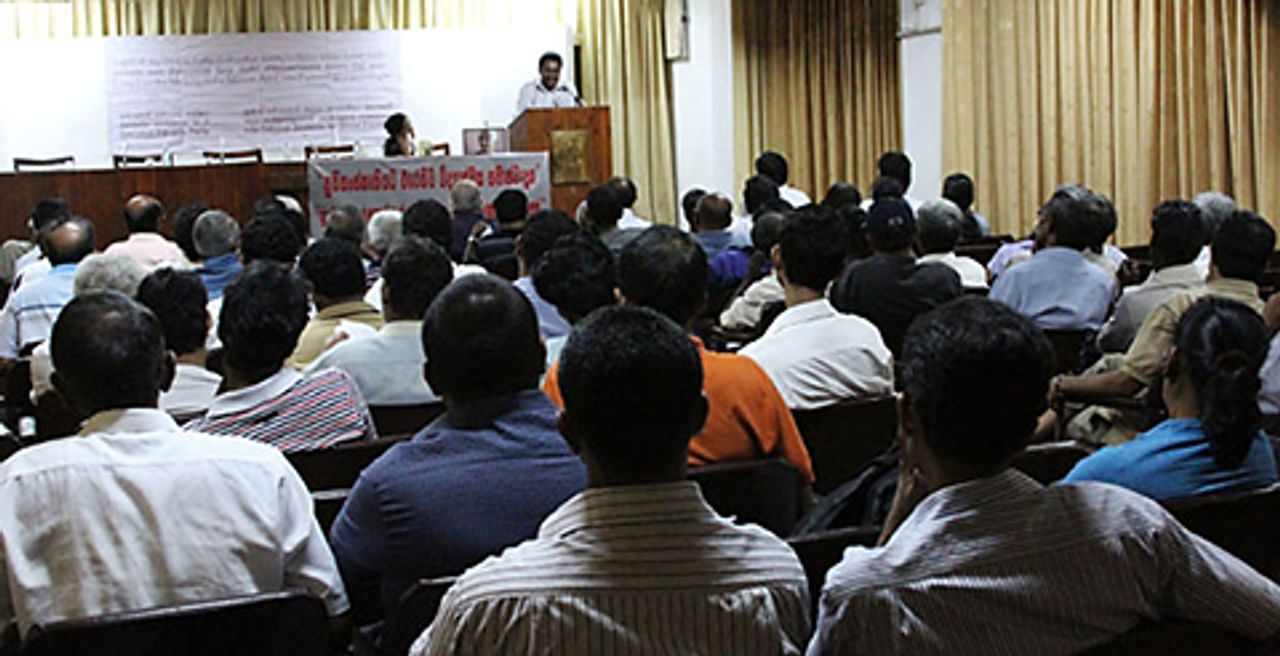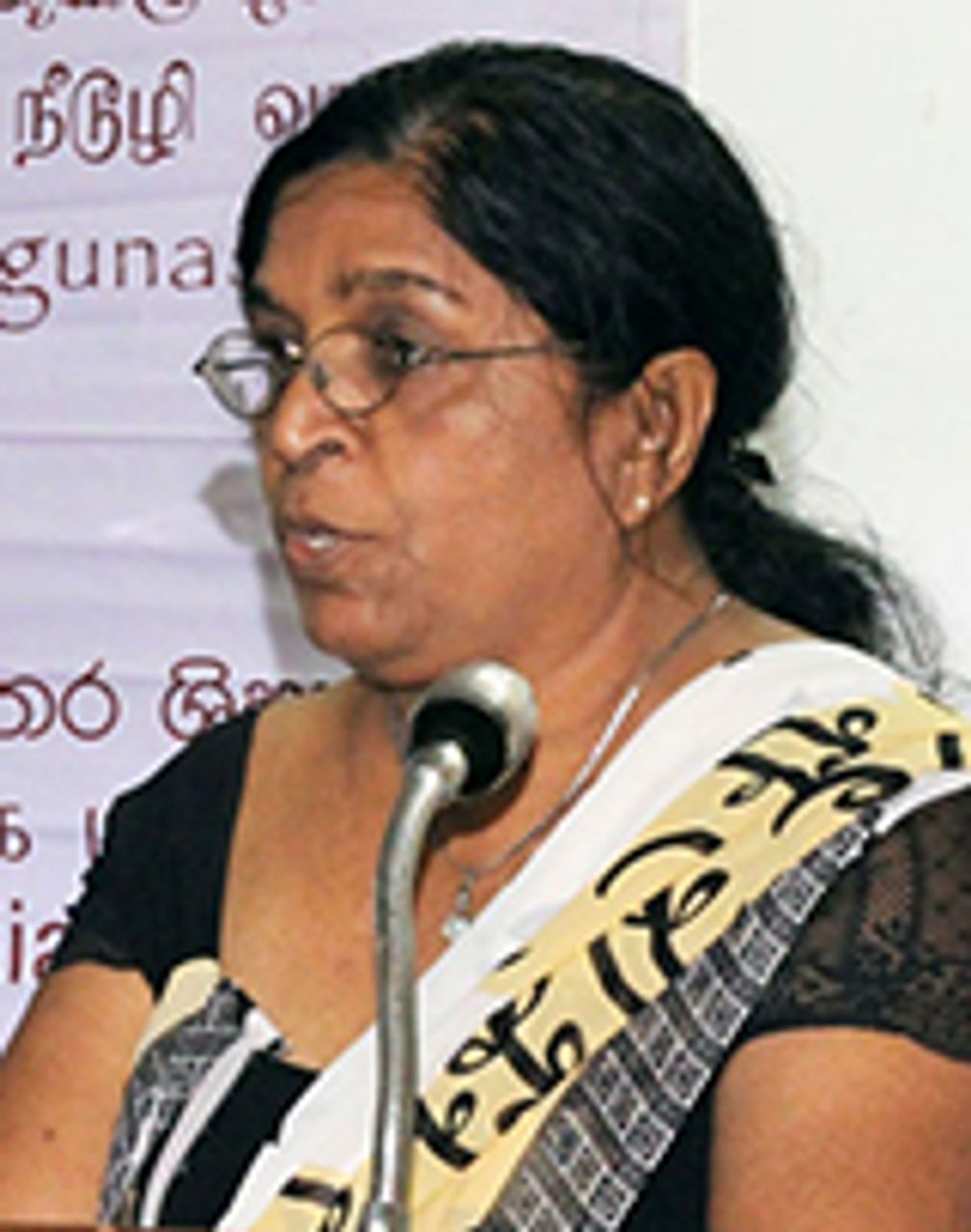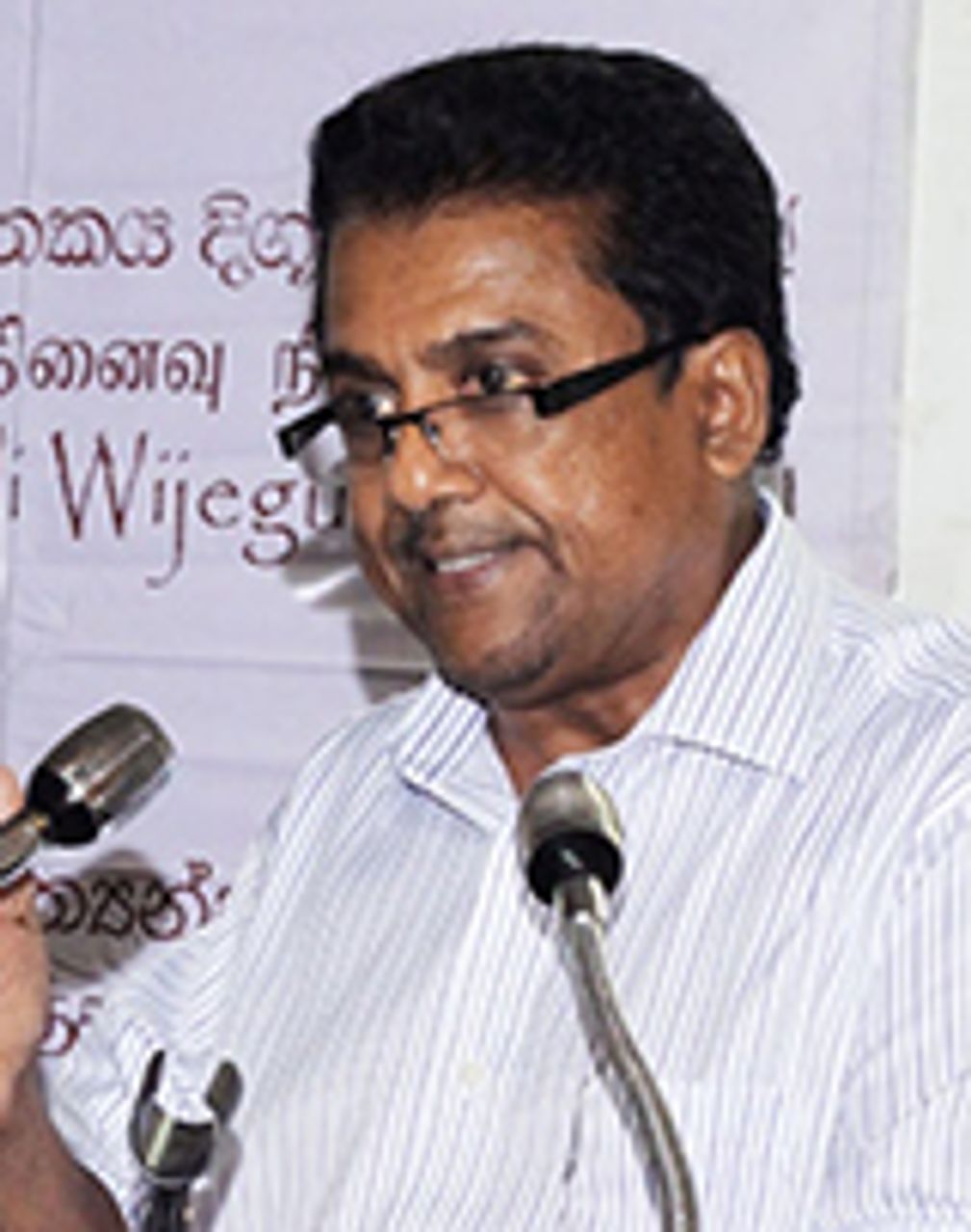The Socialist Equality Party (SEP) in Sri Lanka held a well-attended commemorative lecture on September 30 at Colombo’s National Library Auditorium to mark the second anniversary of the death of long-time SEP member Piyaseeli Wijegunasingha. Panini Wijesiriwardane, a member of the SEP Political Committee, delivered the lecture, “Counterculture or Scientific Socialism,” which explained and defended Piyaseeli’s struggle for Marxism, particularly in the field of art.
 Part of the audience
Part of the audience
Vilani Peiris chaired the meeting and explained that Piyaseeli’s contribution was inseparably bound up with the world Trotskyist movement’s struggle for a socialist culture in the working class. She pointed out that Piyaseeli had produced a number of works in the field of literary criticism, including A Materialist Study of Literature and A Marxist Study of Contemporary Sinhala Literary Criticism. Piyaseeli had also translated important Trotskyist works into Sinhala, including a portion of Leon Trotsky’s In Defence of Marxism, David North’s The Heritage We Defend, and The Aesthetic Component of Socialism by David Walsh.
 Vilani Peiris
Vilani PeirisPeiris welcomed the recent publication of some of Piyaseeli’s writings, including polemics and reviews of films and stage plays, in a book issued by the University of Colombo’s Sinhala department. Piyaseeli had worked as a lecturer at the university for more than four decades, becoming professor in the Department of Sinhala Literature.
In his lecture, Panini Wijesiriwardane focused on remarks made by Liyanage Amarakeerthi, a senior lecturer at Peradeniya University, at the launch of Piyaseeli’s book. Amarakeerthi had commented: “I learnt from her [Piyaseeli] that from whatever theoretical angle one looks at the world, it is the countercultural thinking that is the most significant essence of intellectual life. It is possible to acquire this legacy of countercultural thinking from her lectures and writings.”
As Wijesiriwardane explained, Amarakeerthi used the term “counterculture” to arbitrarily lump together all trends that oppose the norms and standards of the establishment. These included postmodernism and post-Marxism, with which Amarakeerthi identified.
Wijesiriwardane said Piyaseeli had clearly demarcated from these tendencies on the basis of Marxism. She was dedicated to the transformation of the world for the betterment of mankind in the only way possible, through the overthrow of capitalism. She had written that it was possible to ensure “the progress of human culture only through the revolutionary practice of the working class in which the potential for the overthrow of the capitalist system historically resides.”
Amarakeerthi had claimed that Piyaseeli had foreshadowed post-Marxism. He had stated: “She [Piyaseeli] has agreed with some post-Marxist concepts. Significant here is her struggle against an oversimplification of the relationship between the superstructure and the base... It is generally said that the superstructure is determined by the base... Her attempt to prevent this is both explicit and implicit in her writings.” However, Amarakeerthi had not quoted from any of Piyaseeli’s writings.
 Panini Wijesiriwardane
Panini WijesiriwardaneWijesiriwardane explained that Piyaseeli had rejected this postmodernist approach. He cited the preface to Marx’s A Contribution to the Critique of Political Economy that brilliantly outlined the basic conceptions of historical materialism. Marx wrote: “The totality of these relations of production constitutes the economic structure of society, the real foundation, on which arises a legal and political superstructure, and to which correspond definite forms of consciousness.”
Wijesiriwardane said Amarakeerthi rejected Marx’s entire analysis of society, all in the name of avoiding “oversimplification.” Piyaseeli had certainly understood the complexities of the relationship between the economic base of society and various aspects of the superstructure, including art, but she nevertheless insisted on the primacy of the economic base.
Piyaseeli had written: “In the final analysis, Marxists accept the production and reproduction of real life as the determining factor. Therefore they place a special emphasis on the economic foundation.” At the same time, she continued, Marxists highlight “the decisive historical role of Marxist theory and the revolutionary party, the invaluable depository in which that theory is developed, in relation to the fate of the working class, and thus, the whole of mankind” (Principles of Marxist Art Criticism against Sucharitha Gamlath).
Piyaseeli had consistently defended Marxism against so-called post-Marxism. In replying to a young poet in Sri Lanka—who praised postmodernism while claiming to be socialist—Piyaseeli wrote: “Post Marxism is nourished by post modernism. Although these two tendencies assume different appellations, both march hand in hand, attacking the fundamentals of Marxism and defending the capitalist social system.”
Wijesiriwardane drew attention to the origins of the postmodernists praised by Amarakeerthi in a layer of French intellectuals in the 1950s and 1960s who had been associated with the Stalinist Communist party or various left groups that had broken with Trotskyism. They reacted against the emergence of the working class in the May-June general strike in France in 1968. Their hallmark was a rejection of Marxism and the revolutionary role of the working class.
In his lecture, Wijesiriwardane also emphasised the reactionary logic of postmodernism and poststructuralism. He noted that one of Amarakeerthi’s works, Amuthu Kathawa (Strange Story), included the following diatribe: “The Enlightenment shifted the power to determine the good and the bad and human morals from God to logical reasoning and scientific understanding... It was the logical reasoning of the Enlightenment that was put into practice by the massacres in the two world wars, as well as those carried out in the name of socialism.”
In reality, Wijesiriwardane said, the Enlightenment was a profoundly progressive period. The new ideals of reason, social equality, and democracy had guided the world historic revolutions in America and France in the late 18th century.
Wijesiriwardane explained: “The postmodernists’ claim that the ideas of the Enlightenment led to the world wars in the 20th century is an attack on progressive thinking. According to them, the root cause of imperialist war is not the contradiction between the outdated nation state system and the globalised productive forces. The treacherous role played by the Social Democrats in the First World War and the Stalinist bureaucracy in the Second World War is also ignored.”
He continued: “Attributing the massacre by the Soviet Stalinist bureaucracy of hundreds of thousands of socialists, oppositionists and intellectuals to the Enlightenment and socialism is an attempt to discredit both. Amarakeerthi covers up the treacherous role played by Stalinism. Stalinism has nothing to do with socialism and was a direct product of the abandonment of international socialism and the embrace of reactionary nationalism.”
Wijesiriwardane explained that Amarakeerthi’s hostility to the Enlightenment and Marxist analysis had definite social and political implications. By derailing workers, youth and intellectuals ideologically, it served the interests of the ruling class. A theoretical and political struggle against postmodernism and other anti-Marxist philosophical tendencies was “an essential part of establishing the ideological and political independence of the working class for the overthrow of the capitalism.”
Wijesiriwardane concluded by urging workers, youth and intellectuals to join the Socialist Equality Party and help build it as the new mass revolutionary party.
